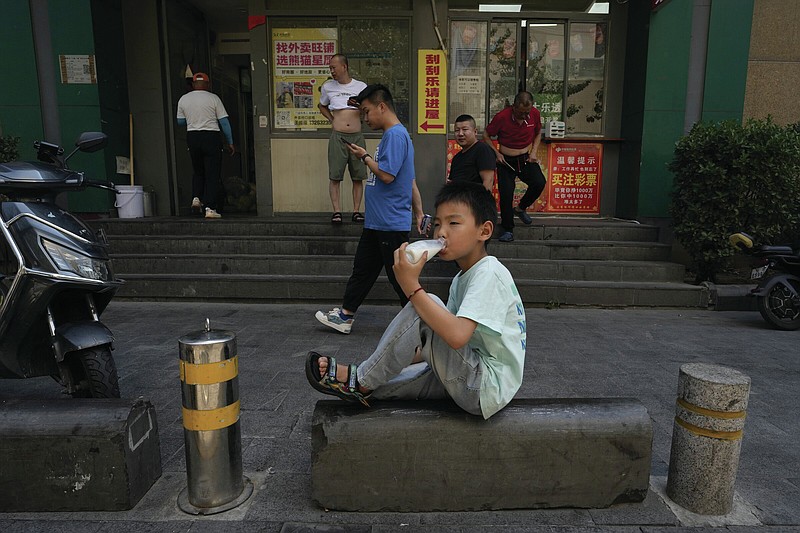Treasury Secretary Janet Yellen said Monday that China's economic slowdown risks causing ripple effects across the global economy, though she doesn't expect a recession in the U.S.
China's economic growth missed forecasts in the second quarter of the year, adding to worries over surging youth unemployment and a weak property sector and raising the likelihood the government will double down on support for the faltering post covid-19 recovery.
The world's second largest economy grew at a 6.3% annual pace in the April-June quarter, much slower than the 7% plus growth analysts had forecast given the anemic pace of activity the year before.
"Many countries do depend on strong Chinese growth to promote growth in their own economies, particularly countries in Asia, and slow growth in China can have some negative spillovers for the United States," Yellen said in a Bloomberg Television interview hours after a raft of Chinese economic data came in weaker than expected. "Growth has slowed, but our labor market continues to be quite strong. I don't expect a recession."
The U.S. is on a "good path" to bring inflation down without a major weakening in the labor market.
Yellen was speaking on the sidelines of meetings with counterparts from Group of 20 economies in Gandhinagar, India. On Sunday, she said that building on the "groundwork" of her recent visit to China was among her objectives. She's also seeking progress on debt relief for poorer nations and reforms to multilateral development banks.
Yellen also said in the interview that China has failed to address the unfair trade practices that triggered increased U.S. tariffs. While a four-year review of those tariffs is underway, the "underlying concerns" have not been dealt with, she said.
The Treasury chief also said that any moves to curb outbound U.S. investment to China would be narrowly targeted and based solely on national-security considerations.
"There is a good chance that we will" go ahead with controls on outbound investments, she said.
Officials have acknowledged that China's economy is facing stiff headwinds, but said they expected growth to still reach the ruling Communist Party's official target for this year of about 5%.
The government will adjust policies to stabilize growth, National Bureau of Statistics spokesman Fu Linghui said at a news conference Monday.
Quarterly growth, the usual measure for other major economies, was 0.8%, according to government data released Monday, in line with expectations but down sharply from 2.2% in January-June.
Analysts have been far less optimistic than the Chinese government about the outlook for the year, given weakening demand for Chinese exports in other major economies.
The numbers are a "worrying result," said Moody's Analytics economist Harry Murphy Cruise.
"China's recovery is going from bad to worse," he said. "After a sugar injection in the opening months of 2023, the pandemic hangover is plaguing China's recovery."
China's faltering economy appears to have helped prompt a shift in the willingness of senior Chinese officials to engage in diplomatic talks with geopolitical rivals abroad, and to show more openness on economic policy at home.
Despite several years of fraying ties and concerted efforts to become less dependent on one another, China and the United States remain closely linked economically, together accounting for two-fifths of global output.
In the past month, China has welcomed senior U.S. officials to Beijing, including John Kerry, President Joe Biden's climate envoy, who arrived Sunday. Up to three Chinese ministers are expected to travel to Washington in the coming weeks, as the two countries have begun discussing everything from climate change to military issues.
The Chinese government has also been on a charm offensive directed at domestic and international business leaders.
During the China Development Forum in March and continuing through the World Economic Forum last month in Tianjin, Li Qiang, the country's premier and second-highest official, offered his personal reassurances that China is open for business.
Li met Wednesday with China's big tech companies to encourage them to hire more workers, in a signal that a nearly three-year push to assert greater political control over the sector may be replaced with an emphasis on economic growth. The powerful National Development and Reform Commission, China's top economic planning agency, praised the companies the same day for their investments.
"China's decision making is as hidden from our view as it has ever been, but China's economic weakness is obvious for all to see, even China's leaders, which can't help but be one source of the recent moderation in foreign policy and willingness to engage Washington," said Scott Kennedy, a China specialist at the Center for Strategic and International Studies in Washington.
Information for this article was contributed by Christopher Condon and Annmarie Hordern of Bloomberg News, Keith Bradsher of The New York Times and Zen Soo of The Associated Press.
